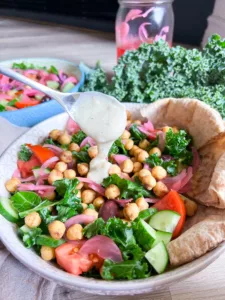Bringing Vitamin A to the Vegan Table: A Guide to Plant-Based Sources
Vitamin A is an essential nutrient that plays a crucial role in maintaining good vision, healthy skin, and a strong immune system. As a vegan, it can be challenging to ensure that you are getting enough of this important vitamin, especially since many of the traditional sources, such as liver and eggs, are off the table.
But fear not! There are plenty of delicious and nutritious vegan sources of Vitamin A that can be easily incorporated into your diet. Here’s a list of the top plant-based sources of Vitamin A, sure to satisfy your cravings and keep your body feeling its best.
Top 20 Vegan Sources of Vitamin A
Vitamin A is an essential nutrient that plays a crucial role in maintaining good vision, boosting immunity, and promoting healthy skin. However, finding enough of this nutrient on a vegan diet can be challenging, which is why it’s important to know the best vegan sources of Vitamin A. The following table provides a list of the top 20 vegan sources of Vitamin A, along with the amount of Vitamin A per serving. This information will help you make informed choices about what to include in your vegan diet to ensure you are getting enough Vitamin A.
| Vegan Source of Vitamin A | Amount per Serving |
|---|---|
| Sweet potatoes | 1 medium (477g) |
| Carrots | 1 medium (61g) |
| Butternut Squash | 1 cup (205g) |
| Spinach | 1 cup (30g) |
| Kale | 1 cup (67g) |
| Dried Apricots | 1/2 cup (74g) |
| Cantaloupe | 1 cup (160g) |
| Mango | 1 medium (249g) |
| Red Bell Pepper | 1 medium (119g) |
| Papaya | 1 medium (150g) |
| Dried Mango | 1/4 cup (40g) |
| Winter Squash | 1 cup (205g) |
| Dried Persimmons | 1/2 cup (74g) |
| Peas | 1 cup (134g) |
| Dried Peaches | 1/2 cup (74g) |
| Sweet Red Peppers | 1 medium (119g) |
| Persimmon | 1 medium (176g) |
| Arugula | 1 cup (5g) |
| Figs (dried) | 1/2 cup (74g) |
| Broccoli | 1 cup (96g) |
The Sweet and the Savory: Fruits and Vegetables Rich in Vitamin A
Sweet potatoes, carrots, and pumpkins are some of the most well-known sources of Vitamin A for vegans. But did you know that leafy greens, such as spinach and kale, are also great sources? For a sweet boost, add some cantaloupe or mango to your smoothies, or snack on dried apricots for a quick and easy on-the-go option.
The Power of Orange: Vegan Sources of Vitamin A In Orange-Colored Foods
The bright, bold color of orange foods, such as carrots, sweet potatoes, and butternut squash, signals their high concentration of Vitamin A. Not only do they add a pop of color to your plate, but they also deliver a powerful dose of nutrients.
Unleashing the Power of Herbs and Spices
Herbs and spices not only add flavor to your food, but they can also add a boost of nutrients. Paprika, for example, is high in Vitamin A, making it a great addition to your spice cabinet.
The Vitamin A Boost: Supplements and Fortified Foods
If you’re having trouble getting enough Vitamin A from your diet, there are vegan supplements available that can help fill in the gaps. Additionally, some plant milk, such as soy milk, and breakfast cereals are fortified with Vitamin A, making them an easy way to increase your intake.
In conclusion, there are plenty of delicious and nutritious vegan sources of Vitamin A. From sweet potatoes and carrots to leafy greens and herbs, there are plenty of options to choose from. Whether you’re looking for a sweet or savory option, a boost of color, or a little extra help from supplements, there’s a vegan source of Vitamin A to suit everyone’s taste. So go ahead, add some Vitamin A to your plate, and feel the difference in your body!
Sources For Plant-Based Vitamin A
The information for the table of top 20 vegan sources of Vitamin A was obtained from various sources including the USDA Food Composition Database, medical websites, and nutrition journals. Some of the specific sites used for reference include:
- USDA National Nutrient Database for Standard Reference
- Medical News Today
- Healthline
- Harvard Health Publishing
- Nutritionvalue.org
- The World’s Healthiest Foods




